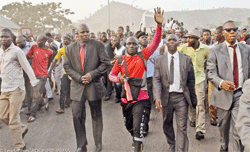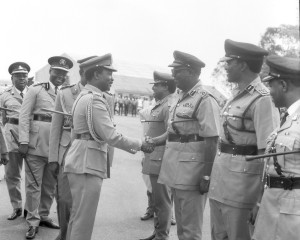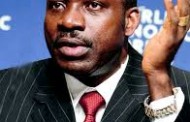When I was growing up in Kumasi, Ghana, Johnnie Walker was a very popular brand of whisky most middle level men loved to fraternise with. The whisky originated from Scotland in the 19th Century. As kids, we used to be fascinated by what was regarded as adults’ stuff. The sight of (real) men sipping the popular drink became irresistible to me especially when every sip was punctuated by a wince followed by a smack of the lips. Curiosity, it is said, kills the cat.
One evening, my old man came back from a party accompanied by a bottle of Johnnie Walker. On sighting him, I told myself almost aloud: “At long, long last, this men’s stuff has walked into our house.” I thought my dad would do justice to the drink immediately. But he did not. Apparently, he had had enough for the evening from the party.
It took him several days before he attended to Johnnie. The label on the bottle depicted a striding man dressed in a tight-fitting pair of trousers and shirt with a swagger stick to boot. In my infantile reasoning, I told a close buddy of mine whom I confided in about the sudden arrival of the legendary Walker at our house that the image on the label suggested to me that any drinker of the stuff would possess the energy to trek long distances as it was the case with us, walking to and from school five days a week.
Once in a while, I would visit Johnnie in the cupboard where he was caged to see if the old man had launched the drink so that I too could take a sip, wince and smack my lips like those adults. My friend extracted a promise from me that any time my dad opened the bottle, I would carry him along. I gave him my word. He too was dying to wince and smack his thick lips.
One evening, I returned from an errand and went straight to the cupboard to check on Johnnie as usual only to discover that he had walked away. I panicked and went searching for the old man in the compound. His (familiar) guffaw fueled by the whisky attracted me to the room of his childhood friend. I announced my presence and told him I wanted him to know that I had returned from the errand. My dad could only respond with a nod because a sip of Johnnie was lodged in his mouth. He waved me out of the room.
I went and sat by our doorstep, monitoring my dad and praying that the duo would not empty the bottle at the end of their tee-a-tete. After a long, agonising wait, the old man emerged with the bottle which he tucked under his left armpit. My heart skipped. I thought the bottle was empty.
I heaved a sigh of relief when he shoved the three-quarter filled bottle to my face and asked me to keep it in the cupboard after which he went out of the compound. Handing over the drink to me was tantamount to wedging a hyena’s jaws with raw meat.
As soon as the old man thinned out of my sight, I searched out a bottle big enough to take just one shot, hoping that the old man would not suspect a foul play. I alerted my friend and we both disappeared from the compound to have a wince-and-smack experience. I served my friend using the cover of the bottle and we quaffed the drink.
A drama followed. The containers flew off our hands and we held tight to our necks, feeling as if our throats had caught fire. As kids, the drink was too concentrated for our fragile oesophaguses. When my friend eventually found his voice, he asked me whether what I got was the actual whisky and not poison.
“Is this what those men sip and smack their lips?” I asked back.
We both dashed back to the house and drank plenty of water to neutralise the burning sensation in our throats. Dinner was not easy for me to swallow much later. My voice became husky and I managed to avoid any conversation with my old man when he came back by going to bed early. After that nasty encounter, I distanced myself from anything hot. That might have accounted for my teetotaler status till today.
Over the past few weeks, a handful of Johnnie Walkers have emerged on the Nigerian space. They are walking for Gen. Muhammadu Buhari’s stunning triumph at the polls. It was Katsina-born Suleiman Hashimu that blazed the trail immediately Buhari was declared president-elect on April 1, 2015.
The construction worker walked his way from Lagos to Abuja, a distance of over 700 kilometres in 18 days. Many flipped up their noses in disbelief. The trekking fever soon spread like Ebola.
Abubakar Duduwale is legging it from Adamawa to Abuja (750km) to attend Buhari’s swearing-in on May 29; Mohammed Jafaru had a better idea. He is bicycling from Kaduna to Lagos (750km) to hug the vice president-elect, Prof. Yemi Osinbajo, in appreciation of the support the Yoruba race gave Buhari. Adamu Abdullahi is marching from Maiduguri to Abuja (800km) in defiance of the Boko Haram danger just to be part of the inauguration.
Armless and Legcedes owner, Ibrahim Musa, is already on his way from Kaduna to Abuja with a petition to Buhari over the plight of the physically challenged. Paul Tankwa is pounding the road from Jalingo to Otuoke (660km) to present an award to President Goodluck Jonathan by May 29 for being a good loser. Another Jonathan fan, Oladele Nihi, is also footing it from Abuja to Otuoke for Jonathan. The only woman so far sucked into the trekking syndrome, Hajiya Talatu, is lumbering from Kaduna to Abuja (200km).
I hope the folks at the National Sports Commission (NSC) are keeping tabs on these trekkers now that the 2016 Rio Olympic Games are around the corner. Nigeria can now boast of potential athletes for the race walking event to shock the entire world in Brazil and other meets. All they need is grooming.
When Nigeria came back from the 2012 London Olympics empty handed, save the medals clinched by the paralympians, I wrote in this column that we should turn to the Makoko community in Lagos among other people residing in littoral environments to fish for raw talents to be groomed for the medal-spinning aqua events at the next Games. Everything to do with the Makoko folks is all about water: They live their lives on water, sleep on water, eat on water, trade on water, socialise on water, etc. But nobody listened to me, even as the next Olympics trek nearer.
Blueprint.













